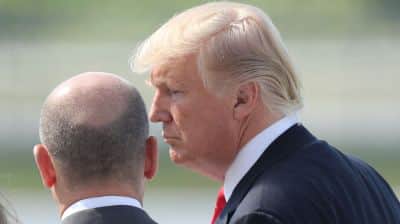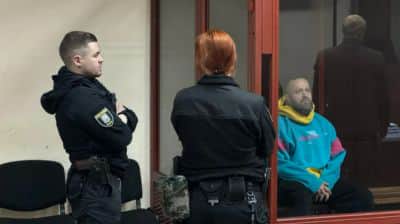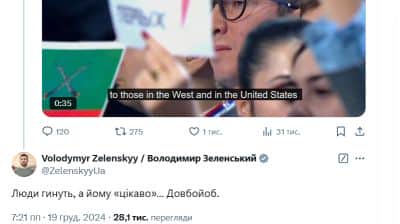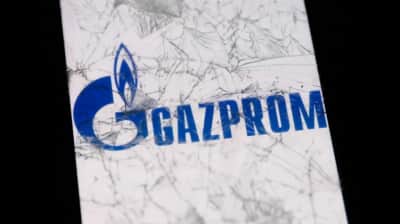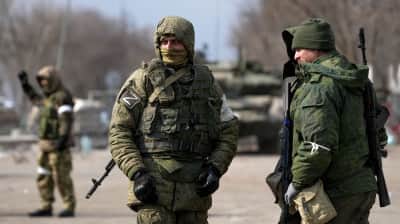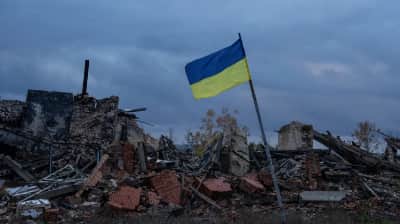Georgiy Kasianov: From Historical Fallacy to Tragic, Criminal Loss: Putin's Case for Invading Ukraine
On February 24, 2022, Russia launched a large-scale invasion of Ukraine. A variety of data indicate that the aggressor was counting on a blitzkrieg.
Russian police units moved with the army – they were supposed to "ensure law and order" as the military seized territory.
The Ukrainian military seized equipment and uniforms intended for the "victory parade," while operational documents indicate that the invasion’s maximum planned duration was two weeks. Russian commanders provided their troops with rations and fuel for two to three days.
To put it simply, the picture in the heads of Putin and his comrades seems to look like this: the valiant Russian army would enter the territory of Ukraine. The brotherly Ukrainians, exhausted after suffering under "nationalists and drug addicts," would welcome the liberators.
The enemy forces would disperse into the bushes. The liberators would receive a special greeting in the southern and eastern regions of the country. Smiling girls in traditional scarves would meet their brave Russian brothers and offer them bread and salt. The Russian elder brothers would then install a proper government of teetotalers and "internationalists" in Kyiv.
Ukraine, Die Hard
This rosy picture of Putin’s Ukrussia broke up in the very first hours of the invasion. The Ukrainian army did not disperse. On the contrary, Ukrainian soldiers demonstrated their readiness to fight even in the most hopeless situations. The Ukrainian border guards on Snake Island have given European history an update of Cambronne’s "Merde!" at Waterloo (1815). Their response to the offer to surrender, "Russian battleship—fuck off!" instantly became the motto of national resistance.
The "special military operation" in the north of the country completely failed. Russia’s losses in manpower (some estimates place casualties at more than 18,000) are already being compared to the total number of casualties in the decade of the Afghan war (1979–1989). The hundreds of destroyed helicopters and jets are bad enough. Even worse for Putin’s army are the videos of Ukrainian tractors towing away abandoned Russian military vehicles and the images of decapitated modern Russian tanks strewn across Ukrainian fields and towns.
All of Ukraine fights. Even though almost surrounded, Sumy and Chernihiv refused to surrender. Even the more successful Russian advances in the south came with severe losses. Mykolaiv continues fighting, and Odesa is preparing to fight off the coming onslaught. Mariupol, destroyed by brutal bombing, still does not surrender. In the occupied cities of the south, Ukrainians openly protest against the occupiers, cursing them to their faces and even trying to stop tanks with their own bodies. In the east, Kharkiv is fighting desperately.
Ukrainian enlistment offices cannot cope with the number of volunteers seeking to join the army and territorial defense units. Hundreds of thousands of civilians instantly set up a large-scale assistance system to help both the military and refugees. About 10 million citizens have fled from the slaughter perpetrated by Putin’s "liberators." Of these, close to four million (primarily women and children) have left Ukraine entirely.
Epic failure
Putin and his entourage lost their gamble. He did not take Ukraine…and he will not. Instead, he has earned his country thousands of dead Russian soldiers, unprecedented economic and political sanctions, and coordinated international isolation. The tightening noose of broadening sanctions strangles Russia’s economy. Ordinary Russians are threatened with 15 years in prison for mentioning negative news, or even the word "war." Putin has brought his nation a gloomy future and unpredictable consequences. His 20-year quest to join the pantheon of "great" Russian rulers has slipped irrevocably from his grasp.
Experts in a wide range of fields are trying to predict what lies in the weeks and months ahead. They are speculating about the prospect for negotiations, about what concessions might suffice for Putin to agree to peace, and about various scenarios for the outcome of Putin’s war, ranging from his defeat to the outbreak of nuclear war.
Whatever the result, it is clear that Putin has suffered a shameful defeat. His colossal army was incapable of winning the proverbial "small victorious war" against a people that Putin considered capable only of singing beautiful songs, performing fiery dances, and cooking tasty borsch. It turned out that Ukraine was not some provincial backwater populated by Russia’s "little brothers," but a modern, sovereign, European nation, capable of defending itself. More than that—it is also defending Europe. When his war machine stalled on Ukrainian roads, Putin opted to target civilian targets like schools and hospitals. At his command, Russia is now killing civilians and fueling a humanitarian crisis not seen in Europe since World War II, which reveals his gloom, frustration, and confusion.
Historical fallacy as a casus belli
Putin’s fatal mistake is not so much in the tactics of the moment, but in his twisted understanding of Ukraine and Ukrainians from a historical perspective—a mistake he shares with a great many of the ruling class and cultural elite in Russia today.
Last July, Putin shared his views on the topic in an article titled "On the Historical Unity of Russians and Ukrainians."[1] There was nothing particularly new in his article, for those who followed his previous expressions on the topic of Ukraine and its people. He had laid his ideas out during the Bucharest NATO summit in 2008. According to him, Ukraine is an artificial state. Ukrainians do not constitute a separate historical entity; they are part of a bigger Russian people. "The West" has tried to seduce and corrupt Ukrainians since the mid-19th century in order to tear them away from brotherly Russia. Today, vast stretches of contemporary Ukraine in the south and east come from Russian territories illegitimately transferred by Soviet leaders, from Lenin to Khrushchev. How can these Russian lands be considered part of Ukraine, itself a construction of the now-dissolved Soviet Union? Putin again stressed these historical fictions in his speech to the Russian nation on the eve of war.
It is not clear where and how Putin got his ideas about history. Some elements of Soviet textbooks on the history of the USSR are easily recognizable. Some nostalgia for a pre-Soviet imperial era is clear. But the "how" of Putin’s historical ideology no longer matters. What matters is the practical outcome of Putin’s fake history. His historical illusions about Ukraine and Ukrainians are now fueling aggression, warfare, violence, and humanitarian disaster right in the center of Europe.
The fundamental fallacy underlying Putin’s worldview, and that of his cronies and supporters, is the inability to recognize Ukraine’s and Ukrainians’ sovereignty as a culture, a state, and a nation. In short, Putin cannot perceive Ukraine as a nation with agency, and Ukrainians as individuals with their own history. Putin believes that he came to restore order in his own backyard. He has cast his action at home and abroad as a "special military operation," as if it is happening somewhere in Russia. Within this bad logic, it is legitimate to annex part of a neighboring sovereign state, wage a hybrid war in Donbas, impose unacceptable demands on the leadership of his target nation, and blackmail the world community with the threat of nuclear war.
Weeks into the invasion, Putin’s view has been met with harsh reality. To Putin’s likely surprise, Ukrainians reject the status of little brother to the bigger Russian brother. They perceive themselves as a distinctive entity. They want to be a part of Europe and recognized as a soverign nation and people. They are ready to fight and die for that future.
Back in the spring of 2014, at the beginning of Russia's hybrid war against Ukraine, 89 percent of respondents in a nationwide poll called Ukraine their homeland—regardless of their nationality, language, or religion. The share of those who would like their region to secede from Ukraine and become part of another state was 8 percent.[2] The Russian-speaking population of the southeast now curses the "liberators" in their own language and to their faces. These so-called Russian compatriots do not want Putin to defend them. Instead, the people who live in Putin’s "historical Russian lands" (lands mistakenly granted to Ukraine by the Bolsheviks, according to Putin) today regard these lands as an organic part of Ukraine.
Ukrainians now only perceive Putin’s ideology of the "Russian World" in the form of Russian missiles, tanks, and shellings—and the devastation of ruined houses, schools, hospitals, and dead friends and family. They are ready to resist it by all available means.
In the decades (if not centuries) to come, we should expect that Ukrainians will be reluctant to accept any advances or overtures from their Russian neighbors. Putin has cemented Russia in the mind of Ukraine as enemy number one, thanks to Russian aggression and atrocities and most of all, the death of thousands and the displacement of millions. Putin is trying to destroy Ukraine, and this means all citizens of Ukraine: Ukrainians, Russians, Jews, Poles, Crimean Tatars, Germans, Romanians, Roma, Belarusians, and more than 100 nationalities that have resided in Ukraine over the centuries.
The bitter irony of Putin’s quest for greatness is this: Putin did help bring Russia out of the turmoil of the 1990s. He did so in part by constructing its sense of national greatness in the story of Russia’s, and the Russian people’s, Great Victory as the true liberator of Europe from Nazism. Today, Putin is weaponizing this myth by casting his war as necessary to defeat "Ukrainian Nazis." Devastated Ukrainian cities, the killings of civilians, millions of refugees: all of these pictures are reminiscent of World War II. However, this time, the role of Nazi Germany is performed by Russia.
Propaganda as a deadly trap for the propagandist
For the past 15 years, the Russian media and spin doctors have portrayed Ukraine as a sanctuary for caveman nationalists, and as a country torn by internal contradictions, mismanagement, and corruption. They have presented the public actions of politically marginalized right-wing groups as the cornerstone of national politics. Noisy nationalist activists, such as the torchlight processions on Bandera’s birthday,[3] were portrayed in Russia as national festivals enjoyed by all Ukrainians. Russian viewers of state media never heard that the majority of Ukrainians ignored or disapproved of these forces, and that their parties cleared 5 percent in national parliamentary elections only once: in 2012, as a nationalist reaction to Russia’s candidate Viktor Yanukovych’s successful presidential campaign.
Putin and his entourage have spent years telling the Russian people about internal discord in Ukraine, and especially the desire in Ukraine’s Russian-speaking east and south to rejoin Russia. They believed their own fakes. Most expressly, they ignored recent history. Even in the tumult of 2014, Ukrainians proved effective in combatting external threats and marshalling resistance through horizontal mobilization. Ukrainians’ low trust in state institutions translated into a remarkable ability and willingness to self-organize in defense of their freedoms. The story of the two upheavals of 2004 and 2014 should have demonstrated decisively that Ukrainians can and will fight and die for their human rights.
Conclusion
Putin’s tragic mistake, for Ukraine but also for himself, is that he based Russian action on a set of historical illusions and ill-minded propaganda. Putin may have found his fantasies about Ukraine comforting and even inspiring, and they may have been useful propaganda to explain the world to his citizens on his terms. These beliefs were the foundation of his confidence that his "special military operation" in Ukraine, which has resulted in actions that many already consider war crimes, would be both easy and justified. It is a classic case of translating historical myth into criminal deeds, comparable to undertakings like Hitler’s belief in Sonderweg and his dream of the millennial Reich. In attempting to tear down Ukraine in order to restore it to Russia, Putin instead strengthened Ukraine’s identity, pride, and self-assertion. In killing Ukrainians, he has killed his "historical Russia" fantasies—this time, forever. This is reality, not a historical dream.
Georgiy Kasianov
